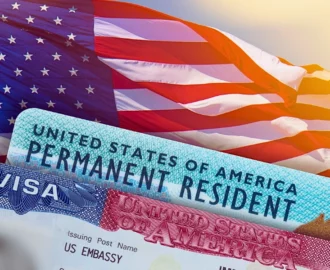You have legal rights when getting deported, such as the ability to have an immigration attorney represent you, request a custody redetermination, and explore other types of relief to prevent deportation.

If you need help avoiding deportation from the U.S., you may be able to get assistance from an experienced immigration lawyer in Chicago. To consult an attorney, call The Law Offices of Cheng, Cho, & Yee, PC, at 312-853-3088.
Knowing Your Rights Before and During Deportation
Illinois alone has seen 162 deportations so far in 2024, with a total of 28,129 deportations since 2003. There are legal rights when getting deported in the U.S. These include:
The Right to Remain Silent
One of the rights you have prior to and during deportation is the right to remain silent. Upon detention, you can verbally or through writing request the right to stay silent during the deportation process, which will help you avoid direct questioning until you can receive representation from deportation attorneys.
Depending on the state, you may need to first identify yourself before requesting this right.
The Right to Avoid Searches
If immigration officials want to search you or your possessions or property, you can refuse to consent to these searches. However, officials may still perform a pat-down search on your clothes to confirm you don’t have a weapon on your person.
The Right to Legal Representation
When under arrest or detention, you may request representation from either a government-appointed or personally consulted attorney. The circumstances here will depend on whether U.S. Immigration and Customs Enforcement (ICE) arrests you for deportation.
If officials outside of ICE detain you, you can have a government-appointed attorney represent you in your case. On the other hand, if ICE detains you, the government won’t need to provide you with representation, but you can find affordable attorneys who may be able to provide alternative representation.
The Right to Make a Phone Call
You can make a private phone call if the police arrest you. You can make this call from the police station or another facility where police take you, and they are unable to listen to this call if you’re consulting a lawyer over the phone.
Grounds for Deportation and Removal
There are a few key reasons the U.S. government may choose to deport or remove an individual. These include:
- Entering the country unlawfully
- Having a history of criminal convictions for certain crimes, including more severe ones known as “crimes of moral turpitude”
- Gaining unlawful employment in the U.S.
- Violating the terms expressed when gaining legal entry
If an immigration court judge or government initiated deportation or removal you in error, an immigration lawyer may be able to build a case in your favor and prove that you can continue to live and work in the U.S.
What Are the Consequences of Deportation?
If the U.S. government deports you, you will be unable to reenter the country for a period of time ranging from five years to a permanent ban. In most cases, deportees will need to wait 10 years before they’re able to come back to the U.S.
The following is a breakdown of the different ban periods and how they work:
Five-Year Ban
Deportees will be unable to return to the U.S. for five years under certain circumstances. For example, they’ll receive a five-year ban if the government deports them at an American port of entry or border when deemed inadmissible for immigration.
People may also receive this ban if they undergo formal removal proceedings to issue their removal or deportation after initially coming to the U.S. You will also be banned for five years if you either leave during the middle of immigration court proceedings or fail to attend them.
10-Year Ban
You may receive this ban if an Immigration Judge sees your case and decides on removal, regardless of your presence at the hearing.
20-Year Ban
Individuals who attempt to reenter the U.S. before their 10-year ban has ended will receive a 20-year ban preventing their return.
Permanent Deportation
You may be unable to enter the country after any period of time if you attempt to enter after being deported or if you have a criminal conviction for an aggravated felony.
You can discuss the ban you face with an attorney, who may be able to prevent the government from deporting or removing you. Attorneys can also answer questions you might have about reentering the country after deportation, such as, “Can a deported person come back legally by marrying a citizen?”
Steps You Take to Protect Your Rights
In the event of a deportation or removal, there are key steps you’ll need to take. The following are measures you can take to protect your rights before a final order of removal.
If Arrested, Record All Details and Seek Medical Attention
If ICE or police arrest you, try to write down all the details of the incident. You can choose to remain silent before getting an attorney on your side, but you can take the time to record information such as officer names, badge numbers, patrol vehicle numbers, witness information, and the officers’ agency.
If needed, seek immediate medical attention to treat any injuries you may have sustained during your arrest or detention. Before doing so, take photos or record video footage of your injuries, if possible.
Seek Help from an Attorney
In Illinois, you can connect with an immigration lawyer to help you with understanding the deportation process and discuss the options available to you. Specifically, the state’s Right to Counsel Act gives you permission to hire an immigration lawyer who may be able to take action to prevent deportation or removal in your case.
Build Your Case With Evidence
To further avoid deportation and removal, it’s important to collect as much supporting evidence as you can.
With the help of an attorney, you can collect and organize documents to build your case, such as:
- Tax records
- Passports
- Green cards
- Marriage and birth certificates
- Pay stubs
- Leases
Your attorney could then work to organize all documentation into a viable case to help you secure your stay in the U.S.
In addition to this evidence, you must work with your lawyer to develop a convincing story that explains why you deserve to stay in the country. For instance, you may show that you provide valuable services as an employee with good intentions behind your residency, and that you are actively contributing to your community by staying. You could also detail how your family might suffer if the government were to deport and remove you.
Request a Custody Redetermination or Seek Another Option
With a story in place, you and your attorney may choose to request a custody redetermination to help ensure you’re able to remain in the U.S. This process will involve a hearing, during which time your attorney can explain on your behalf why you don’t pose a risk by staying in the country.
However, a custody redetermination may not get you the results you want, in which case you may be able to take other actions to stay in the country.
For instance, you could avoid deportation by arguing that you’ll face persecution by returning to your country of origin, which could enable you to stay in the country as a refugee or in asylum. You might also be able to get a cancellation of removal under certain circumstances, or you could change your immigrant status to something like a nonimmigrant worker.
Another option could involve voluntary departure, which would allow you to leave without facing the consequences of deportation.
Your lawyer should be able to discuss every available option with you to determine which will work best in your case.
Know Your Rights When Facing Deportation
Every individual in the U.S. has rights, including immigrants who face deportation or removal. Knowing how the deportation process works and your rights as an individual can help you take the right steps to avoid the consequences of deportation, whether you’re able to argue that you’re able to remain in the country legally or wish to voluntarily depart.
Having an attorney at your side can go a long way in helping you combat the government’s attempt to deport or remove you. The right representation can discuss the kinds of options you have when it comes to staying in the U.S. and represent you when interacting with immigration officials and police.
Want to learn more about your legal rights when getting deported and avoid the potential issues associated with deportation? The Law Offices of Cheng, Cho, & Yee, PC, can help you build a strong case in your favor. Contact us today to learn more about what we can do for you.




